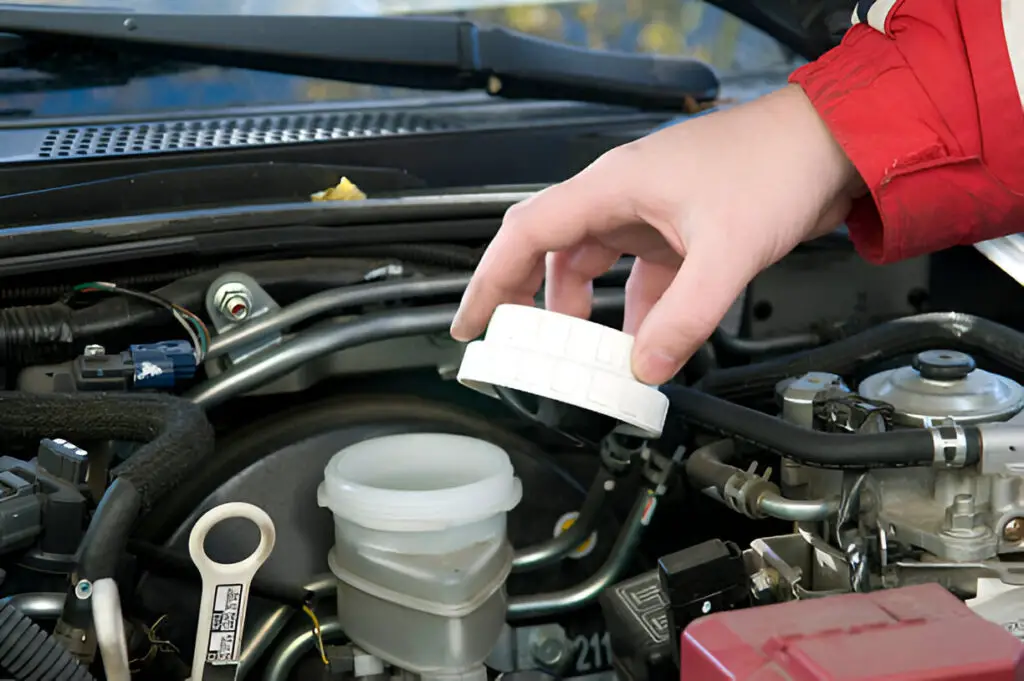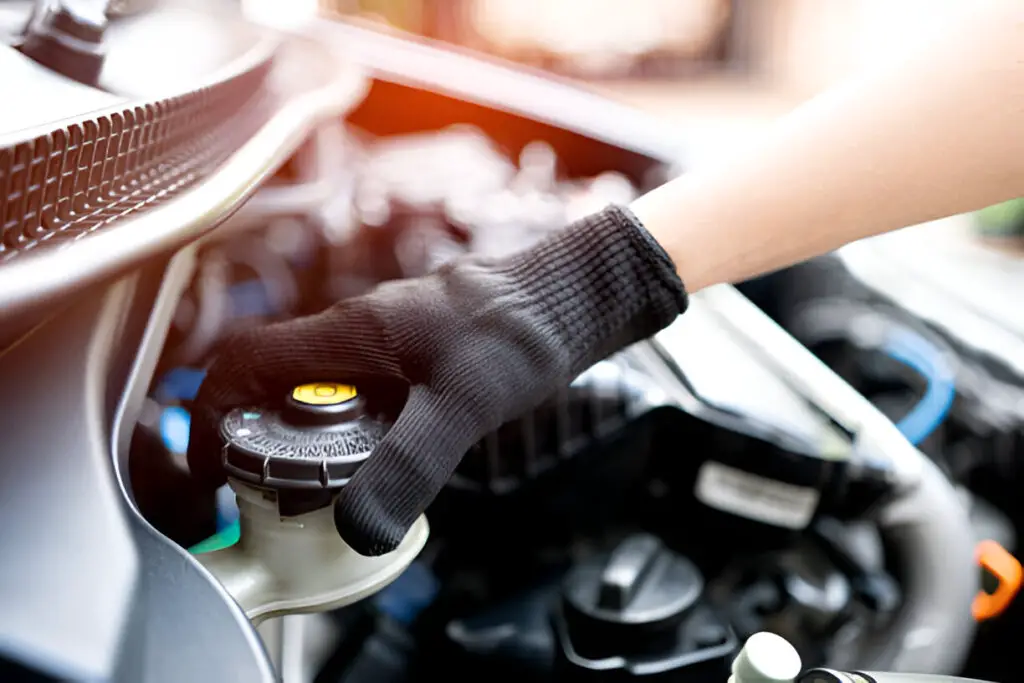Topping off brake fluid ensures your brakes work properly. Low fluid can affect braking performance and lead to failure. Always use the correct fluid and check levels regularly. If fluid is often low, check for leaks.
When it comes to maintaining your car, most drivers are familiar with essential fluids such as engine oil, coolant, and windshield wiper fluid. However, one often-overlooked fluid is brake fluid. This critical component is vital for the safe operation of your vehicle, and topping off brake fluid is an essential part of ensuring that your brakes remain in optimal condition.
This blog post will dive deep into the importance of brake fluid, when and how to top it off, and how to recognize potential issues with your braking system.

Contents
Why Is Brake Fluid Important?
The hydraulic braking system depends entirely on brake fluid to function. The key role of brake fluid is to convert the mechanical force from pressing the brake pedal into hydraulic force, which then pushes the brake pads against the wheels to create friction and slow the vehicle down. Without adequate brake fluid, the system will not function properly, leading to reduced braking performance, longer stopping distances, or even brake failure.
Brake fluid also helps lubricate the moving parts of the braking system and prevents rust and corrosion from forming inside the components. Over time, brake fluid can become contaminated with moisture, dirt, and metal particles. This is why maintaining the correct level and quality of brake fluid is crucial for your safety on the road.
How to Tell When You Need to Top Off Brake Fluid
Several signs can indicate that you need to check and potentially top off your brake fluid:
1. Low Brake Fluid Indicator Light
Most modern vehicles have a brake fluid warning light on the dashboard, typically in the shape of a circle with an exclamation point inside. If this light illuminates, it’s an indication that the brake fluid level is low. However, a light could also signal other issues such as a malfunction in the braking system, so it’s essential to investigate further.
2. Spongy or Soft Brake Pedal
If you notice that the brake pedal feels soft or spongy when pressed, it could be a sign that there’s air in the brake lines or the brake fluid level is too low. If the brake fluid is low, the brake system will not be able to generate enough hydraulic pressure, causing the pedal to feel less responsive.
3. Unusual Brake Performance
Any changes in how the brakes perform can be a red flag. If you notice that your vehicle takes longer to stop than usual or the brakes seem less effective, it may be time to check the brake fluid. Consistent brake squeaking, grinding, or other unusual noises are also signs of brake issues.
4. Visible Fluid Leaks
If you notice brake fluid leaking from the area around your wheels or underneath the car, it’s a sign that there’s a leak in the brake system. Leaking brake fluid can cause a gradual loss of pressure, making it unsafe to drive. If you see any signs of brake fluid leakage, it’s important to address the issue immediately.
5. When Was the Last Brake Fluid Change?
Brake fluid doesn’t last forever. Over time, it absorbs moisture from the air, which lowers its boiling point and reduces its performance. The average lifespan of brake fluid is around 2 years, but it’s important to follow your vehicle’s manufacturer recommendations for fluid replacement intervals.

How to Top Off Brake Fluid
Topping off brake fluid is a simple process, but it’s essential to handle the task with care. Brake fluid is highly corrosive and can damage your vehicle’s paint if spilled, so always exercise caution. Here’s a step-by-step guide on how to top off brake fluid:
1. Locate the Brake Fluid Reservoir
The brake fluid reservoir is typically located near the back of the engine bay, on the driver’s side, near the brake master cylinder. It is usually a small, translucent plastic container with a cap that might be labeled “Brake Fluid.” Consult your vehicle’s owner manual if you’re unsure about the location.
2. Check the Fluid Level
Before adding any brake fluid, check the current fluid level. The brake fluid reservoir will have a minimum and maximum level indicator marked on the side. The fluid should be within the range of these markers. If it’s below the minimum line, then it’s time to top it off.
3. Add the Correct Brake Fluid
Make sure you are using the correct type of brake fluid for the vehicle. The brake fluid type (DOT3, DOT4, DOT5, etc.) should be indicated on the cap of the brake fluid reservoir or in your owner’s manual. Be cautious not to mix different types of fluid, as they may not be compatible. If you are unsure, it’s always better to stick with the type specified by the manufacturer.
Use a clean funnel to carefully pour the brake fluid into the reservoir until it reaches the maximum line. Avoid overfilling, as this could lead to brake fluid leakage when the fluid expands due to heat.
4. Check for Leaks
After topping off the brake fluid, inspect the brake lines and surrounding components for any signs of leakage. If you notice fluid leaking from the reservoir or along the brake lines, it’s essential to have the system inspected and repaired by a professional.
5. Test the Brakes
Once the brake fluid has been topped off, pump the brake pedal a few times to ensure it feels firm. Start the car and check that the brakes are functioning correctly before heading out on the road.
When Should Brake Fluid Be Replaced?
Topping off brake fluid is a temporary solution to ensure that your brake system functions properly, but it’s not a permanent fix. Over time, brake fluid breaks down and becomes contaminated with moisture and debris. This can compromise its performance and the safety of your braking system. The general recommendation is to replace your brake fluid every 2 years or 24,000 miles (whichever comes first), but always check the vehicle’s maintenance schedule for specific recommendations.
How to Maintain Brake Fluid Levels and System Health
To maintain brake fluid levels and system health:
- Regular Inspections: Check the brake fluid levels regularly, particularly if you notice any changes in your brake performance.
- Avoid Contamination: Keep the brake fluid reservoir cap clean and free from dirt to avoid contaminating the brake fluid.
- Use Quality Fluid: Always use high-quality brake fluid that meets your vehicle’s specifications. Cheap or incorrect fluid can lead to premature system wear or failure.
- Flush the Brake System: Brake fluid should be replaced periodically, not just topped off. A brake fluid flush involves completely draining the old fluid and replacing it with new fluid.
Frequently Asked Questions
Here are some FAQs about topping off brake fluid –
1. Can I top off my brake fluid with any brake fluid?
No, you should only use the brake fluid type specified by your vehicle’s manufacturer. Mixing different types of brake fluids can lead to poor braking performance and damage to the braking system.
2. What happens if I overfill the brake fluid?
Overfilling the brake fluid reservoir can cause the fluid to spill when it expands due to heat, potentially damaging surrounding components or causing the brake fluid to evaporate faster. Always ensure the fluid is within the recommended range.
3. How often should I check brake fluid?
It’s a good practice to check the brake fluid level during your regular car maintenance routine, ideally every few months. Additionally, check it if you notice changes in brake performance or if the brake fluid light illuminates.
4. Can I drive with low brake fluid?
It’s not advisable to drive with low brake fluid, as this can compromise your braking performance, leading to longer stopping distances and, in extreme cases, brake failure. Always top off or replace low brake fluid immediately.
5. Can I top off brake fluid myself, or should I see a mechanic?
You can top off brake fluid yourself if you’re comfortable with basic car maintenance. However, if you suspect a leak or if the brake fluid frequently runs low, it’s important to have a professional mechanic inspect your brake system.
Conclusion
Maintaining brake fluid is a key aspect of ensuring that the vehicle’s braking system remains reliable and safe. Regularly checking and topping off brake fluid is simple and can prevent serious issues down the road. Always follow the vehicle’s maintenance schedule and address any brake fluid concerns promptly to ensure the safety on the road.